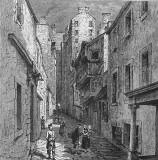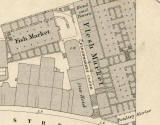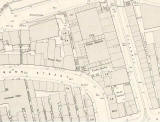|
Yvonne wrote:
"I
found this in the Concise Scots Dictionary (editor -in-chief Mari
Robinson). It was my mum book."
|
Plowt
|
|
1 & c. (plaut also plut plat,&c) plunge or
thrust (something) into (a liquid) submerge quickly in.
2. set down suddenly and heavily, plump or
slap down
3. fall heavily freq into a liquid la19- now
ne per wgt
4. walk through water or over wet ground
squelch along; dabble in water or mud 19 -now sh abd ags
5. of liquids, esp rain fall with a splash,
pelt down la19-now shabd ags
|
|
1. a noisy fall or plunge esp into water etc;
a splash plop 19 now, now sh-ags wgt.
2. a heavy shower or cascade, a downpour
of rain a thunder-plump (thunder)18 now sh ne nec .
3. a clumsy ,blundering person or animal,
aclod hopper 20 now mry fif
4. a dull blow, punch ,thump 20 -sh abd KIRN$C
a churn operated by a plunger 18- now ork (onomat)
|
|
Plowt 2 (plaut) n joc a dish made of meat
boiled and jellied in a mould esp potted heid (pot) la20 fif (cf plot1 v1
(3)and next)
Plowt 3 (plaut)n
popular name for the Fleshmarket close in Edinburgh orig the meat market
and slaughter-house e20 (unknown)
|
|
Plowter&c; plutter&c 19e20 pl(1)euter19-20
ploiter la19-e20, pleiter& c20 ('plautor,' ploiter; ne also 'pjaut-',
pleit-;g also 'plut-,'plot-,'plit) v
1. dabble with the hands or feet, usu in a
liquid, splash aimlessly in mud or water, wade messily through wet
ground19-,
2. work or act idly or aimlessly, potter or
fiddle about 19-.
3. fumble about, rummage or grope in the dark
20-, local per-slk
4. vt make a mess of, spoil (esp a piece of
land by bad cultivation)19-, now sh abd n
|
|
1. the act of working or walking in wetness or
mud, a splashing about; a (disagreeable) messy task; a blotched job, an
exhibition of slovenliness orinefficiency19-
2. a splash, dashing of liquid 19-, now sh ags
3. a wet, muddy spot, a bog, mire19-20 .
4. a sloppy or sticky mess of food etc la19-,
local shsw.
5. a messy inefficient worker, a muddler 20-,
nowc-y&c of the weather etc weather etc wet, showery rainy, puddly la19-20
(chf sc; frequentative of plowt 1;cf also Du ploetern dabble in water,
drudge).
|
Yvonne added:
"I did not think this information was so long.
I hope you can understand this the book. They have abbreviations for all
the dates.
Yvonne Cain (née Dorr), New South Wales, Australia: August 14, 2008. |


